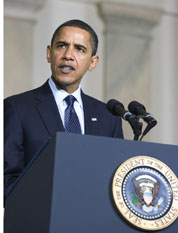 Just days after going on a mini-tirade over bonuses Wall Street executives received for 2008 at the same time they were seeking government aid, President Barack Obama announced a cap on executive compensation for firms receiving federal support from the Troubled Assets Relief Program (TARP). Mr. Obama’s actions come behind a proposal from Senator Clair McCaskill (D-MO) to limit pay. The new measure caps pay at $500,000 and restricts any additional compensation to stock that cannot be sold until the company has made the government whole.
Just days after going on a mini-tirade over bonuses Wall Street executives received for 2008 at the same time they were seeking government aid, President Barack Obama announced a cap on executive compensation for firms receiving federal support from the Troubled Assets Relief Program (TARP). Mr. Obama’s actions come behind a proposal from Senator Clair McCaskill (D-MO) to limit pay. The new measure caps pay at $500,000 and restricts any additional compensation to stock that cannot be sold until the company has made the government whole.
In making the announcement the President said, “We all need to take responsibility. In addition, this includes executives at major financial firms who turned to the American people, hat in hand, when they were in trouble, even as they paid themselves their customary lavish bonuses. As I said last week, that’s the height of irresponsibility. That’s shameful. And that’s exactly the kind of disregard for the costs and consequences of their actions that brought about this crisis: a culture of narrow self-interest and short-term gain at the expense of everything else.”
In addition to the cap, President Obama indicated that companies would have to disclose publicly all perks and luxuries received by senior executives and offer a public explanation justifying the expenses.
Mr. Obama’s actions come after a series of politically incorrect actions by corporations that called attention to the disconnect between their leadership’s behavior and the nation’s economic crisis. One of the first blunders was committed by insurance giant AIG. Shortly after the company had been bailed out by the federal government, it was revealed that its top executives went on a junket. It was not alone in appearing oblivious to the deteriorating economic picture. Detroit auto executives ignited a firestorm when they traveled to Washington on corporate jets several months ago. Just recently, Citi Group found itself in a pr nightmare after word got out that it was taking an order on a new corporate jet. Through persuasion by the White House, the firm relented and agreed to sell the jet. Then word arrived from the New York State Comptroller that Wall Street bonuses, though not record setting, but approximating one of the Street’s best years.
The President’s actions were not surprising given the level of public anger over executive pay. Still, an angry public aside, the move by Obama further reflects the bind in which some companies now exist. Many are facing the prospect of closure if they do not receive government assistance so they will have no choice, unwillingly for the most part, to play by the President’s rules.
Few could have imagined the day when the federal government would take an ownership interest in financial firms and secure the debt of failing companies. Though instituted under emergency circumstances, the move by President Obama does raises questions over the extent to which the federal government will “nationalize” industries, a direction that some will view as a move towards socialism or some form of socialist prescription to the economic crisis. For decades, the debate over universal health care has primarily centered over whether the federal government should be the primary provider as critics have argued that should not be its responsibility. Like the latter issue, the takeover of private firms or providing aid, and dictating the compensation of corporate executives, will be viewed by many people as overreaching into private markets by the government.
The move by President Obama is certain to spark much debate in the days and weeks ahead. While there will be little that firms that appear to have mismanaged their finances can say; there will be companies that due to no fault of their own will need government aid to weather the recession. Executives in those firms will be placed under the same restrictions as the bad actors, and that may actually discourage some companies from making requests for support. If that were to occur, some businesses may end up eventually closing their doors, resulting in significant job losses. Though conventional wisdom would suggest that survival trumps corporate pride, some companies may feel that taking government aid will bind them in a way that undercuts their potential in the market.
Now the focus will be on prospective firms that might need TARP funds and the compensation of those executives, and whether those that have yet to apply will see this as an opportunity to stay afloat or as a backdoor social policy experiment.

today in black history
February 24, 2026
A.M.E. Bishop Daniel Payne, first Black president of a Black college (Wilberforce), is born on this date in 1811 in Charleston, SC.
Obama Clips Corporate Wings
Firms Seeking Aid Must Limit Exec Pay
POSTED: February 05, 2009, 12:00 am



















